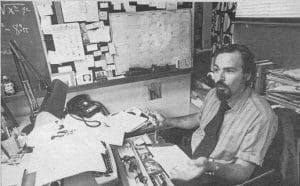A writer, editor, and illustrator, Meglin taught art at New York’s School of Visual Arts. But he spent just about his entire career at one magazine, starting in 1956, and what a magazine: MAD. While he rarely had a byline in the magazine, he was first listed in the masthead as the guy who gave them “Ideas”. When he went into the Army, he still contributed to MAD — and listed in the masthead as “War Correspondent”. MAD’s founder and publisher, the late Bill Gaines, called Meglin “the heart of the magazine.” Meglin was hired at about the same time as editor Al Feldstein, who was “a skilled craftsman at producing a magazine on time and in giving the best possible presentation to the work of his freelance writers and artists,” says Mark Evanier, a comic and TV writer, and a historian of the comics industry, “but Feldstein wasn’t all that funny. Meglin was funny. He wrote much of MAD’s editorial material (intros, ads, etc.). He rewrote or punched-up articles that were in need of extra laughs.”

“Feldstein was not humorous,” agrees MAD comic Al Jaffee, who created the “fold-in” feature. “He appreciated humor, but he didn’t inspire humor. Nick inspired humor.” When Feldstein left the magazine in 1985, Meglin (and John Ficarra) split duties on that role, supervising the “Usual Bunch of Idiots” who created the content — the “cartoonists who influenced comedy for generations,” says cartoonist Michael Cavna, “living legends who became so well-known to fans of magazine satire — the MAD men who helped pave a cultural path for ‘Saturday Night Live’ and ‘The Simpsons’, the Onion and ‘The Daily Show’.” Meglin pushed the magazine to refocus not on spoofing other comic books, but instead to point its lens at politics and popular culture — which grew its circulation to a peak of 2 million readers. “Nick’s sense of humor was a defining part of MAD magazine,” says MAD caricature artist Tom Richmond. “No other single person had as much to do with creating and perpetuating the MAD ‘voice’ as he did.” After working for the magazine for 48 years, Meglin retired in 2004 — to write for musical theater, including the lyrics for a musical version of the movie Grumpy Old Men. He died June 2, from a heart attack, at 82.
